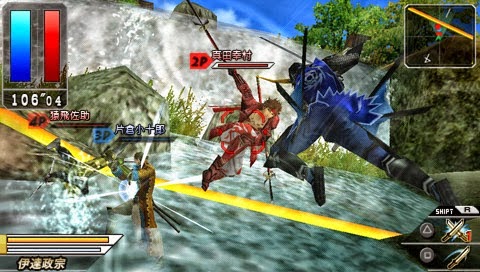고정 헤더 영역
상세 컨텐츠
본문

This article relies too much on to. Please improve this by adding. ( February 2011) Sengoku Basara ( 戦国BASARA) is a series of developed and published by, and a bigger based on it, including three shows, an anime movie, a magazine series, a trading card game, and numerous stage plays, and drama cds. Its story is loosely based on real events of the titular period in the history of.
Sengoku Basara Battle Heroes Psp English Patch 1
Sengoku Basara Battle Heroes merupakan Game Hack n Slash yang dirilis oleh Capcom untuk PSP,konsol lain seperti PS2 dan PS3 juga terdapat game Sengoku Basara tetapi dengan seri yang lain.Tidak jauh dengan Sengoku Basara Chronicles Heroes game ini juga masih dengan gameplay dan alur cerita yang sama,semakin tinggi level yang diselesaikan atau istilahnya mengalahkan Bos disetiap levelnya pemain akan mendapatkan koin untuk mengupgrade kemampuan,kostum dan senjata.
Sengoku Basara is extremely popular in with the video games getting really good reviews, selling really good, winning numerous awards, being used in, and gaining a huge and strong fanbase. While the franchise remains extremely popular in Japan, it has gained some popularity in,. Even though the franchise isn't really known well outside of Japan, Singapore, South Korea, and Taiwan (except for the anime series) it maintains an average-sized but strong fanbase even outside of those countries (mainly the, and ). Sengoku Basara has been noted for its strong resemblance to 's series in terms of concept and gameplay. Every Sengoku Basara game in Japan has gotten a B rating (Ages 12 and up) except for Sengoku Basara 3 Utage which got a C rating (Ages 15 and up) from. The franchise started with the first video game on July 21, 2005 for the. The franchise's producer is and the franchise's director is Makoto Yamamoto.
Sengoku Basara Battle Heroes Romhustler
As of 2018, the game series has sold over 4 million units worldwide. Main article: The original game in the series was released in 2005 for the as a 'crowd-fighting' in the vein of 's similarly themed Samurai Warriors series. Devil Kings, an English-language version of the game featured an altered gameplay and a completely different, supposedly more western audience-oriented fantasy story with original characters. It was never used again due to the negative response the localization received from critics and consumers.
Sengoku Basara 2 Sengoku Basara 2 was the 2006 sequel, also for the. The game was ported to the. The game also sparked a boom in tourism to the hometown of,. Sengoku Basara X. Main article: Sengoku Basara has several adaptations of the games to different mediums.
Notably, two anime series were planned and written by Yasuyuki Muto. The first series, Sengoku Basara, started broadcast in April 2009. The series' second season, titled Sengoku Basara II, began broadcast in July 2010. Further, a movie adaptation titled was released in 2011. All three anime adaptations were licensed and published in the United States. An alternative retelling titled was broadcast in 2014 and licensed in the United States.
A manga adaptation of the second game was created by Yak Haibara. The four volume series, Sengoku Basara 2, was published in Japan in 2007. It was published in the United States in 2012 by under the title Sengoku Basara: Samurai Legends. The title change was due to Sengoku Basara 2 not being released in the United States. Shimotsuki Kairi created a more general adaptation in 2005 titled Sengoku Basara Ranse Ranbu.
Radio shows have been produced and released on four CD volumes. A stage play based on Sengoku Basara 3 was announced on July 17, 2011 and ran October 1–30, 2011. A live-action television drama titled Sengoku Basara: Moonlight Party premiered on July 12, 2012 on the. Related products A large range of merchandise has been created for the series, including, trading cards and figures.

References.





